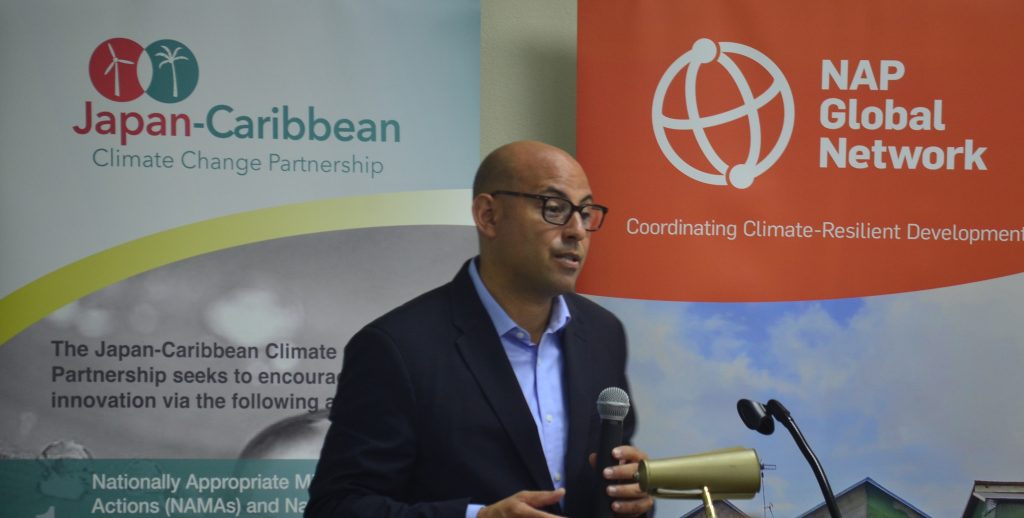Coverage via Grenada Broadcast Network Television
ST GEORGE’S, OCT 12, 2016—Representatives from 10 Caribbean countries and development agency partners will meet in Grenada’s capital of St. George’s this week to discuss strategies to prepare for the impact of climate change.
Grenada held the final consultation on its National Adaptation Plan (NAP) on Tuesday, October 11, and will now host peers from the region to share lessons from its experience through a two-day regional workshop.
“Here in Grenada, we don’t have to look far to see the impacts of climate change. We experience them every day,” said Senator Simon Stiell, Minister of State with responsibility for the environment.
“Grenada’s National Adaptation Plan process will help protect against the potentially devastating effects of extreme weather like Hurricane Ivan in 2004,” said Kevin Andall, Permanent Secretary with responsibility for Human Resource development and the environment. “We look forward to sharing what we have learned about national adaptation planning with others in the Caribbean community to build our countries’ resilience to climate change.”

The NAP process was created by the United Nations as an opportunity for countries to plan for sustainable development in the face of climate stress.
The Paris Agreement calls on all countries to engage in NAP processes, and each country’s NAP is driven by its unique adaptation needs. In this two-day NAP Assembly, adaptation planners from Caribbean countries will share their experiences of national adaptation planning and action.
This NAP Assembly is co-hosted by Grenada’s Ministry of Education, Human Resource Development and the Environment; the UNDP Japan-Caribbean Climate Change Partnership (J-CCCP); and the NAP Global Network.
“Climate change effects pose a serious threat to the livelihoods of many Caribbean people,” said Anne Hammill, Director of the NAP Global Network secretariat. “Through robust national adaptation planning processes that consider the needs of different key sectors like agriculture, health and tourism, countries can make important strides toward protecting vulnerable communities and ecosystems.”
Adaptation planners attending the event represented 10 countries in the Caribbean: Grenada, Antigua and Barbuda, the Commonwealth of Dominica, St Kitts and Nevis, Belize, Guyana, Jamaica, St Lucia, St Vincent and the Grenadines, Suriname.
The UNDP’s 2016 Caribbean Human Development Report warns climate change impacts such as droughts, floods, saltwater intrusion, and sea level rise could pose a threat to food security in the Caribbean region.
The Caribbean NAP Assembly aims to outline next steps in the NAP process for countries in the Caribbean region, and how development partners such as USAID and the UNDP J-CCCP can coordinate their support to help countries to advance their National Adaptation Plans.
“UNDP’s commitment to addressing climate change challenges within the region is certainly seen with the advent and subsequent activities of the J-CCCP. Japan is dedicated to promoting climate-resilient development approaches in the Caribbean, and has been making key investments in climate change adaptation technologies in the region,” said Chisa Mikami, UNDP’s Deputy Resident Representative.
She added: “This workshop is a great opportunity for our colleagues to learn more about the NAP process with the added value of learning from peers. We are keen to have these shared experiences enhance efforts to advance respective NAP processes.”
-30-
Media Contact:
Christian Ledwell
Media & Communications Officer, Resilience
International Institute for Sustainable Development
Email: cledwell@iisd.ca
Phone: +1 613 807 1154
Penny Bowen
Communications Associate
UNDP Sub-regional Office for Barbados and the OECS
Email: penny.bowen@undp.org
Phone: +1 246 836 6008
About the UNDP Japan-Caribbean Climate Change Partnership
The Japan-Caribbean Climate Change Partnership (J-CCCP), launched officially in January 2016, aims to support eight Caribbean countries in advancing the process of low-emission risk-resilient development by improving energy security and integrating medium to long-term planning for adaptation to climate change. Interventions under the Project include supporting policy innovation through the development of a number of Nationally Appropriate Mitigation Actions (NAMAs) and National Adaptation Plans (NAPs) and implementing actual technology that is both low-emission and advances climate risk management, including demonstration in the target countries. The participating countries are Belize, the Commonwealth of Dominica, Grenada, the Republic of Guyana, Jamaica, Saint Lucia, St. Vincent and the Grenadines, and the Republic of Suriname. This project is funded by the Government of Japan and is implemented by United Nations Development Programme (UNDP).
About the NAP Global Network
The NAP Global Network was created in 2014 to enhance support for national adaptation planning through peer learning and exchange, improved coordination, and supporting national level action on NAP development and implementation. The Network’s participants include representatives of bilateral donors, as well as participants from nearly 30 developing countries involved in creating and implementing national adaptation plans. Initial funding for the Network is provided by the United States’ State Department and Germany’s Federal Ministry of Economic Cooperation and Development BMZ. The Secretariat is hosted by the International Institute for Sustainable Development (IISD).
